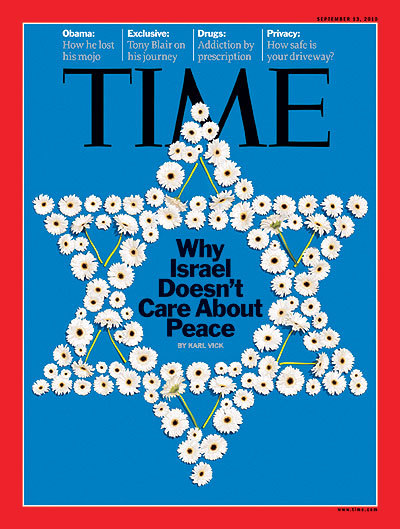The truth? In the week that three Presidents, a King and their own Prime Minister gather at the White House to begin a fresh round of talks on peace between Israel and the Palestinians, the truth is, Israelis are no longer preoccupied with the matter. They’re otherwise engaged; they’re making money; they’re enjoying the rays of late summer. A watching world may still define their country by the blood feud with the Arabs whose families used to live on this land and whether that conflict can be negotiated away, but Israelis say they have moved on… Asked in a March poll to name the “most urgent problem” facing Israel, just eight percent of Israeli Jews cited the conflict with Palestinians, putting it fifth behind education, crime, national security and poverty. Israeli Arabs placed peace first.
Obviously that poll actually shows that Israelis are preoccupied with educating their children, keeping their families safe from crime, and not getting killed by neighboring countries. Ergo listing those as priorities one, two, and three. But why let mere numbers get in the way of “Jews are too busy ‘making money’ to embrace negotiations?”
And obviously the West Bank Arabs with whom the Israelis are negotiating are very explicitly not Arabs who “used to live on this land,” insofar as they’re Arabs who “are living on this land” right now. That’s in sharp contrast to the descendants of Jews who were expelled from Arab lands, and who are being left out of the “comprehensive” peace talks. But why let all that get in the way of eliminationist, anti-Israel themes?
This greediness image has actually been percolating in news magazines for quite a while. Similar to media reports of Israeli organ harvesting and water poisoning, it’s seemingly an explicit echo of a classically anti-Jewish canard. But that kind of historical baggage is undoubtedly a coincidence, which is also why Newsweek felt comfortable trotting this out in January:
The stability, in turn, has helped Israel’s economy… the IMF projected recently that Israel’s GDP will grow faster in 2010 than that of most other developed countries. In short, Israelis are enjoying a peace dividend without a peace agreement… Today, hummus in Damascus has lost its appeal… when Israelis ventured into the Arab world like never before [t]he experience was often disappointing. The peace process failed to erase Arab animosity toward Israelis, who were often received with suspicion or even hostility. Those Israelis who had fantasized about combining Israeli know-how with Arab capital – enabling everyone to get rich – found the bureaucracy and inefficiency of Arab countries dispiriting.
In fairness, this is more “Israelis are uninterested in peace because they can’t get rich from it” than “Israelis are uninterested in peace because they’re already getting rich elsewhere.” Though you’d think that continuing Arab hostility toward the Jewish state as such would dominate any analysis of Israeli burnout, as opposed to how it financially impacts those Israeli Jews who spend their time fantasizing about getting rich. Apparently not so much.
Elsewhere in that Newsweek article: an exegesis on how Israel’s “provocations and abuses, including the continued expropriation of Palestinian land, the dramatic growth of Jewish settlements in the 1990s and the siege Israel has imposed on Gaza,” are ignored in Israeli accounts of Palestinian terrorism and Gaza rocket fire. An explanation for that ostensible cognitive blind spot – something unpacking how Intifada II happened after Israel offered to uproot those settlements, or how the Gaza siege was imposed only after years of that Palestinian shelling – was excised, perhaps on account of length.
Anyway, back to that Time piece. There’s an argument to be made that the balance of the Newsweek article is about Israeli resilience rather than intransigence, and that the money stuff is just a deeply symptomatic aside. Time, not so much:
Which is weird, because just a year ago Time was explaining how Israelis would never achieve quiet if they continued “punishing Hamas.” The magazine’s insistence mirrored earlier media condescension about Israel’s security barrier: “suicide bombers will just climb over it – duh!” The cover for that “punishing Hamas” article, by the by?
At the time some people suggested that the cover was some kind of typical “Jews = Nazis” slur, where the barbed wire imposed on the Star of David was some kind of concentration camp allusion. Other people insisted that Time would never stoop so low as to equate Israeli tactics and Nazi tactics. June 1982:
A few more charming Time covers in that vein are here and here. How genuinely pleasant it is to realize that, even in our era of media upheaval and disintegration, there’s still some consistency to be found in the world of journalism.





COMMENTS
Please let us know if you're having issues with commenting.